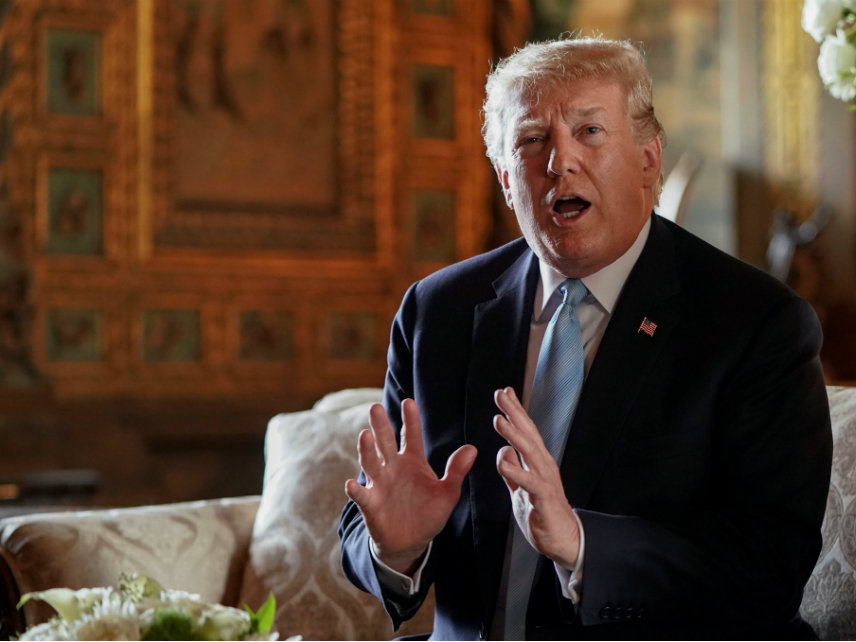Trump's Threat to 'Close the Border' with Mexico Is His Most Insane Trade Idea Yet
Closing the border would be a "profit-making operation," says Trump. That's not how any of this works.

Even by his "Trade Is Bad" standards, President Donald Trump's threat to shut America's border with Mexico is a doozy.
"I'll just close the border," Trump said during a brief press conference Friday afternoon at Mar-o-Lago. "And with a deficit like we have with Mexico and have had for many years, closing the border will be a profit-making operation."
Where to begin with that?
Even if the United States were a single large corporation—a bad analogy for many reasons, but one Trump seems to be grasping towards—closing the border would not be a "profit-making" move, any more than a business would be making a profit by deciding not to buy or sell anything. That's actually a fine way to guarantee that you don't make a profit.
Reading between the lines a bit, a Trump supporter might argue that closing the border with Mexico would reduce America's trade deficit with its southern neighbor. That's probably true, since no trade would indeed mean no trade deficit. But cutting losses is not the same as making a profit—or, in this analogy, eliminating the trade deficit is not the same as creating a trade surplus. A Wharton School grad like Trump should probably know that.
And that whole analogy is flawed, because the U.S. is not a single corporation and the president is not our CEO. Cutting off trade between the U.S. and Mexico would have enormous negative consequences for businesses on both sides of the border, because cross-border trade is the result of countless individual decisions dictated by market signals. It's not the United States that trades with Mexico and vice versa; individuals and businesses on both sides of the border trade with one another, seeking mutually beneficial deals.
"First, you'd see prices rise incredibly fast," Lance Jungmeyer, president of the Arizona-based Fresh Produce Association of the Americas, tells The Washington Post. "We would see layoffs within a day or two."
The scale of trade across the Mexican border is staggering. More than 1,000 trucks cross the border every day at the Calexico East crossing in southern California, the Post notes. Annually, trade between the two countries totals more than $600 billion, according to the Office of the U.S. Trade Representative.
During an address to mayors of cities on both sides of the border last year, San Antonio Mayor Ron Nirenberg noted that more than $1 million worth of commerce takes place along the southern border every minute.
Slamming the border shut would recklessly and unnecessarily disrupt markets large and small. It would wreck international supply chains. And might actually increase illegal immigration. One big reason illegal immigration from Mexico has fallen in the two decades since the North American Free Trade Agreement is the growth in Mexican-based manufacturing. What's going to happen when Trump's border shutdown triggers job losses in those plants?
Trump's comment is yet another indication that the president does not understand how trade works, despite that fact that he's made trade policy one of his administration's signature issues. Trump has falsely claimed that other countries pay for tariffs when in fact they are taxes that U.S. importers pay. He has confused the federal budget deficit with America's foreign trade deficit—and he has claimed that tariffs will reduce both deficits, though the opposite has occurred on his watch. And he often describes trade arrangements as win-or-lose, us-or-them, zero-sum operations controlled by national governments. In fact, trade between nations is beneficial in the aggregate for both sides. It's the result of millions of individual decisions made by people and businesses.
If there's a silver lining here, it's that Trump may not actually mean what he said. To quote National Review's Kevin Williamson, Trump's version of America First nationalism is "3 percent policy and 97 percent aesthetics, rhetoric, and affectation, a kind of identity politics of the Right."
Talking smack at Mexico, at the people who come to the United States from Mexico, and at the American businesses that do business with businesses in Mexico is an essential part of Trumpian nationalism. Threatening to close the border is probably more akin to Trump's campaign promise that Mexico would pay for the border wall than a proposal the White House seriously plans to push.
And yet the White House doubled down on Trump's nonsense on Sunday. Kellyanne Conway, Trump's White House counselor, told Fox News that the president's threat "certainly isn't a bluff."
If so, Trump is about to embark on the most insane and counterproductive trade policy yet.


Show Comments (215)